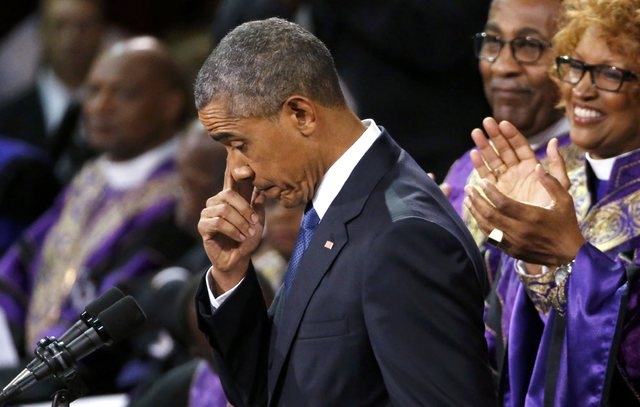Obama eulogizes Charleston pastor ‘who lived by faith’
President Obama delivered a touching eulogy, a rousing political speech and a thoughtful meditation on race in America when he traveled to Charleston, South Carolina, to speak at the funeral of Rev. Clementa Pinckney, who was gunned down last week by a racist terrorist during bible study.
But the President’s speech will be remembered for a moment at the end when the he launched into a solo of “Amazing Grace,” that at first stunned the mourners and then brought them to their feet as they joined him in song.
Obama eulogized the Rev. Clementa Pinckney, one of the victims in last week’s church massacre, calling him a “man of God who lived by faith.”
“We are here today to remember a man of God who lived by faith,” Obama said. “A man who believed in things not seen. A man who believed there were better days ahead, off in the distance. A man of service who persevered knowing full well he would not receive all those things he was promised, because he believed his efforts would provide a better life for those who followed.”
The president’s remarks both memorialized the victims and touched upon the current controversy surrounding the Confederate flag and what he said was a need for more gun control in the wake of the tragedy.
“By taking down that flag we express God’s grace,” he said.
Friday’s funeral service for Pinckney isn’t the first time Obama delivered a high-profile eulogy, and with a year and a half remaining in office, it may not be the last.
But when the president stood in historic downtown Charleston to remember the slain pastor and eight others shot down in their church last week, his speech moved beyond just grief for the victims — Obama stepped directly into a national conversation about race in which he plays a central role.
The president, first lady Michelle Obama, Vice President Joe Biden, a bipartisan host of high-level members of Congress and Hillary Clinton headed to TD Arena for the memorial service a week after a 21-year-old man opened fire at a Bible study inside Charleston’s Emanuel African Methodist Episcopal Church.
The shooter declared he was there to “kill black people,” and an online manifesto attributed to him contained white supremacist screeds.
Obama, responding to the shooting hours into its aftermath, said the attack “raises questions about a dark part of our history” and called racism “a particular threat to our democracy and our ideals.”
Later, speaking during a podcast interview, he candidly addressed new questions about American racism prompted by the attack, using the N-word to explain that suggestions the country has been “cured” of racism are misguided.
The shooting in Charleston left Obama “shaken,” according to Rep. James Clyburn, a South Carolina Democrat who spoke with Obama the morning after the incident.
Unlike past times Obama has confronted an act of violence, he knew the highest profile victim of the Charleston shooting personally. Obama met Pinckney as an early supporter of his 2008 presidential bid. Biden met the pastor and state lawmaker less than a year ago at a prayer breakfast in the state capital.
That personal connection differentiated Friday’s eulogy from the funerals Obama keynoted after previous shootings. So, too, are the renewed questions on race spurred by the shooter’s apparent motivations.
Around the country, traditional symbols of the Confederacy have come under renewed scrutiny, including the Confederate flag that flies at the South Carolina State House.
Obama himself used some of his bluntest language to date on race during an interview with comedian Marc Maron on Friday, saying that just because the N-word is no longer used frequently in public, “that’s not the measure of whether racism still exists or not.”
The moment was a distant cry from the earlier days of Obama’s presidency, when he studiously avoided discussing race or the implications of his election to office.
“I think that the President has grown very weary of having to circumvent these issues, which a lot of people thought was the appropriate thing for him to do as President of the United States,” Clyburn said. “But I think he has reached a conclusion that he needs to meet this issue head-on.”
Ryan Julison, who is a spokesman for Walter Scott’s family, told CNN “The family of Walter Scott will attend today’s funeral for Reverend Pinckney. They want to show the same support to the community that the community showed to them.”
RELATED
Pastor killed in Charleston church shooting mourned at South Carolina state capitol
Thousands gather in Charleston for shooting victims memorial
Feds to file hate crime charges in Charleston shooting, report says
Firefighter fired after Charleston shooting Facebook comment
Ala. governor orders 4 Confederate flags removed from state Capitol




























